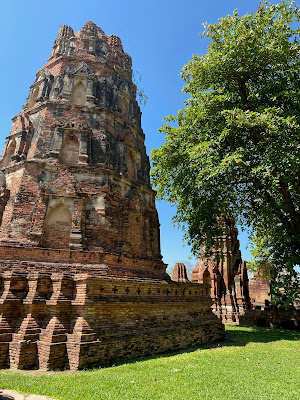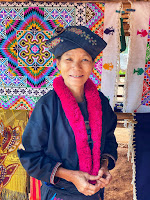30 hours of travel time from Portland to San Francisco to Taipei, Taiwan to Bangkok, Thailand!
Daily: 90 degrees and 90% humidity.
Bangkok The modern pagoda is a tomb-like structure in which cremains are stored.
Many display photos of the deceased.
Ayutthaya There are 120 sitting Buddha statues dotted around the area.
One of the most photographed spots in Ayutthaya, Wat Phra Mahthat is comprised of a large stone Buddha head set in a colossal and deep-rooted tree. Exactly how the head became locked in its present location is unclear, however it is thought to be linked to the immense flooding and destruction of previous years, and the rapid vegetation growth which ensued afterwards.
Everyday sites.
The Grand Palace and Wat Pra Kaew command respect from all who have walked in their sacred grounds. Built in 1782, and served as the home of Thai Kings and the Royal court for 150 years. The Grand Palace continues to have visitors in awe with its beautiful architecture and intricate detail. Gold leaf is used to adorn Thai temples.
In Thailand there are some 300,000 monks living in the Land of Smiles. Monks and nuns are responsible for the preservation and dissemination of the Buddha’s teaching and guidance of Buddhist lay people. Everyday they rely on food and alms for their livelihood. In our hotel rooms we found The Teaching of Buddha and The New Testament (in English and Thai).
Because many homes lack cooking facilities, the Thai visit the market daily for their meals.
Common forms of transportation.
Mae Salong Mountains

Wat Rong Khun, better known as the White Temple was built in 1997. The incredibly detailed, all-white exterior represents Buddha's purity.
Nearly everything about the temple depicts a religious or symbolic message. In addition to the pure white color choice, much of the structural choices, mythical creatures, and positions of the White Temple’s guardians and deities depict a religious or symbolic meaning. The common theme of the temple is of escaping greed and desire and moving towards enlightenment through Buddha’s teachings.
The bridge to the entrance crosses over a sea of arms reaching out for help from the fiery depths of hell. Skulls, demon heads, and pop-cultural figures from the underworld.
Siem Reap, Cambodia
Next, we flew back to Bangkok and transferred to another flight to Siem Reap, Cambodia, the gateway to the Angkor temples.
Angor Thom
The architectural masterpieces of Angkor Thom and Angkor Wat, are designated as one of the "Seven Wonders of the World". This sprawling city, built by Khmer Kings was once home to more than one million people at the height of the empire.
Angor Wat
Angkor Wat is a temple dedicated to the Hindu god Vishnu. World-famous for its beauty and splendor, Angkor Wat has the longest continuous bas-relief in the world, which runs along the entire outer gallery walls, narrating stories from Hindu mythology.
The skies are usually gray and yellow towards sunset. A hot air ballon can be seen near the pillar.
The world-famous complex Angkor Wat is surrounded by a moat and an exterior wall, covering rectangular area of 500 acres and the moat sandstone causeway alone was 825 feet in length, which makes it the largest religious monument ever constructed.
Want to challenge yourself? Try climbing the 70 percent inclined stairs of Angkor Wat to the uppermost temples.
We were given a tour of a silk factory where we saw caterpillars eating mulberry leaves then forming silk cocoons. The cocoon is soaked in hot water and the delicate thin strands of silk are removed, dyed and spun into beautiful fabric.
Chiang Mai Wat Suan Dok was built in late 14th century by a King of Chiang Mai and was originally intended to serve as a retreat for a revered monk from Sukhothai.
Cambodia The vast majority of Cambodia’s 15 million people live in the country.
After an ox cart ride on a scenic, bumpy, dirt road we took a boat ride on Tonle Sap Lake in the heart of Cambodia where we saw a floating fishing villages.
Thousands of people live on Cambodia’s water ways.
We ate delicious food, saw many more things and places than described above and stayed in amazing hotels. Such friendly, polite and happy people in the Land of Smiles. All of the photos were taken with an iPhone 11pro.





















































No comments:
Post a Comment